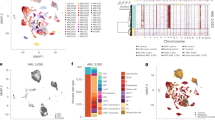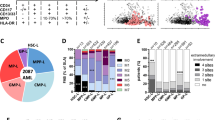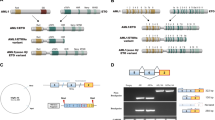Abstract
AML1/RUNX1 is a critical transcription factor in hematopoietic cell differentiation and proliferation. From the AML1 gene, at least three isoforms, AML1a, AML1b and AML1c, are produced through alternative splicing. AML1a interferes with the function of AML1b/1c, which are often called AML1. In the current study, we found a higher expression level of AML1a in ALL patients in comparison to the controls. Additionally, AML1a represses transcription from promotor of macrophage-colony simulating factor receptor (M-CSFR) mediated by AML1b, indicating that AML1a antagonized the effect of AML1b. In order to investigate the role of AML1a in hematopoiesis and leukemogenesis in vivo, bone marrow mononuclear cells (BMMNCs) from mice were transduced with AML1a and transplanted into lethally irradiated mice, which develop lymphoblastic leukemia after transplantation. Taken together, these results indicate that overexpression of AML1a may be an important contributing factor to leukemogenesis.
Similar content being viewed by others
Article PDF
Author information
Authors and Affiliations
Rights and permissions
About this article
Cite this article
Liu, X., Zhang, Q., Zhang, De. et al. Overexpression of an isoform of AML1 in acute leukemia and its potential role in leukemogenesis. Nat Prec (2008). https://doi.org/10.1038/npre.2008.1795.1
Received:
Accepted:
Published:
DOI: https://doi.org/10.1038/npre.2008.1795.1



